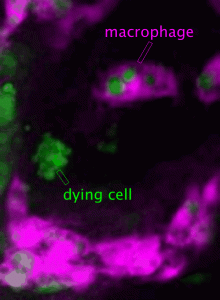Fully-funded PhD available: Old-age macrophages? Programming distinct immune behaviours across the lifecourse
Posted by Iwan Evans, on 5 November 2024
Location: University of Sheffield
Closing Date: 13 December 2024
A fully-funded PhD position is available to study macrophage biology using fruit flies and cell culture techniques in the Evans lab at the University of Sheffield. The project is funded by the MRC and you would be part of the MRC Discovery Medicine North (DiMeN) Doctoral Training Programme cohort for 2025. The project is supervised by Iwan Evans, Endre Kiss-Toth and Heather Wilson in the School of Medicine and Population Health and you would be a member of the Bateson Centre and Heathly Lifespan Institute. Sheffield is a dynamic and exciting city, located close to the beautiful Peak District and the University of Sheffield has exceptional microscopy facilities and a very well-run Drosophila facility. See below for more information and do not hesitate to get in touch if you are interested in the project (i.r.evans@sheffield.ac.uk). Closing date 5pm 13th Dec 2024.

Project description
The white blood cells known as macrophages play fundamental roles in development, homeostasis and immunity. Dysfunction of these important innate immune cells underlies many morbidities, including cancer and cardiovascular disease. Furthermore, during ageing, immunosenescence and constitutive inflammation/inflammageing contribute to declining health.
Our recent work using human macrophages identified transcription factors (TFs) with altered expression during ageing, causally associated with impaired immune functions (e.g., phagocytosis/cell migration). The key regulators downstream of these TFs remain unknown and represent targets for pharmacological interventions to improve immunity in the elderly.
Fruit flies have played vital roles in ageing and immunity research. As in humans, flies contain macrophage populations that decline and alter in function with age. Our identification of Drosophila macrophage subpopulations expands the range in immune phenotypes that can be studied in this model. Alongside these relevant and evolutionarily-conserved aspects of blood cell biology, flies represent a superlative genetic model that enables high-throughput and cutting-edge imaging approaches to be employed.
We will use fruit fly genetics to identify the critical effectors downstream of key transcription factors responsible for compromised macrophage behaviours during ageing. We will seek to translate our findings to vertebrate cell culture models. This work will identify mechanisms involved in immune contributions to age-related decline and help generate new anti-ageing therapies with particular relevance to cardiovascular disease/cancer and impaired immunity in the elderly.
In this project, the student will use fly genetics to identify critical regulators driving age-related macrophage dysfunction. The behaviour of fly macrophages will be followed live, in vivo, using advanced light microscopy, generating quantitative measurements of key macrophage behaviours. Ultimately critical regulators will be investigated via manipulation in human monocyte-derived macrophages to improve function in cells taken from older donors.
The student will therefore receive training across key transferrable skill sets that include: working with a genetically-tractable, whole organism, in vivo model, live imaging, cutting-edge light microscopy techniques, image analysis, molecular biology, cell culture, bioinformatics and quantitative approaches. These skills are highly transferrable across a range of career destinations.
We pride ourselves on our diverse, welcoming, and supportive research environment and the student will be supported by a supervisory team with an excellent track record in support of postgraduate research. Our labs are members of the Healthy Lifespan Institute (https://www.sheffield.ac.uk/healthy-lifespan) and the Bateson Centre (https://www.sheffield.ac.uk/bateson) ensuring a critical mass of researchers interested in this field of study. Regular lab meetings are also held with a range of labs using diverse models to study immune function. Sheffield is an excellent city in which to study and live – it is multicultural and dynamic and large enough (without being overwhelming) to satisfy any extracurricular interests – while also located close to the outstandingly beautiful Peak District.
Please do not hesitate to follow up any interest by getting in contact (i.r.evans@sheffield.ac.uk) and by visiting our lab website (http://iwanrevans.weebly.com/). This project is particularly suitable for those with an interest in cell biology, in vivo models, live imaging, immunity and ageing.
Start date: 1 October 2025
Closing Date: 13 December 2024
Scientific fields: Cell biology, Development and disease, Haematopoiesis, Metabolism and physiology, Signalling, Regeneration
Model systems: Cell culture, Drosophila
Duration: Fixed term
Minimum qualifications: 2:1 or higher at undergraduate level in a relevant subject

